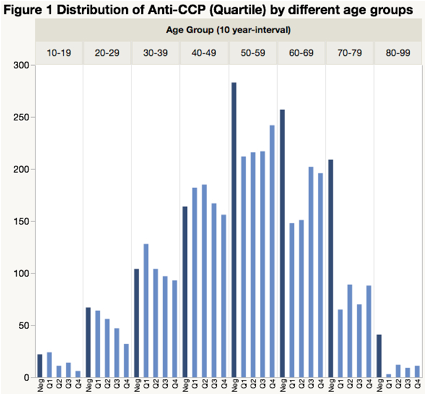Session Information
Date: Sunday, November 13, 2016
Title: Rheumatoid Arthritis – Clinical Aspects - Poster I: Clinical Characteristics/Presentation/Prognosis
Session Type: ACR Poster Session A
Session Time: 9:00AM-11:00AM
Background/Purpose: Previous studies demonstrated the lower prevalence of anti-CCP antibody and rheumatoid factor (RF) in elderly-onset rheumatoid arthritis (EORA). However, anti-CCP antibody titer in EORA has not been fully elucidated. In the present study, we aim to investigate RF and anti-CCP titers in patients with EORA and young-onset RA (YORA) based on a nationwide RA database, National Database of Rheumatic Diseases by iR-net in Japan (NinJa).
Methods: We analyzed 4,445 RA patients, whose anti-CCP titer data were available in NinJa 2014. The cutoff point used in the present study for defining EORA was 65 years of age. The Student unpaired t-test was used to compare the mean values, with p-values of <0.05 (after Bonferroni correction for multiple comparisons) considered to indicate statistical significance.
Results: Prevalence of RF and anti-CCP antibody in EORA (62.0% and 62.1%) was significantly lower than that in YORA (73.5% and 77.9%, respectively), as was consistent with previous studies. The average RF and anti-CCP titers increased, as the age at RA onset increased. There was thus a significant difference in RF levels between 20-29, 30-39 and 40-49 age groups (111, 118 and 103 IU/mL, respectively) and 70-79 age group (128 IU/mL). Anti-CCP titer was significantly higher in 60-69 age group (284 U/mL) than 20-29 age group (170 U/mL). Anti-CCP antibody levels were subsequently grouped into quartiles (Q1: 4.5-40, Q2: 40-124, Q3: 124-434, Q4: >434 U/mL). As shown in Figure 1, the proportion of anti-CCP negative RA patients was higher in the groups with age at disease onset above 50 years. Furthermore, there was a difference in the pattern of anti-CCP distribution, depending on the ages at RA onset. Thus, the higher titer quartiles (Q3 and Q4) were more frequently observed in RA patients with their age at disease onset above 50 years than in those below 50 years. There was a tendency of higher proportion of Q4 in RA patients with history of former and current smoking. However, since the prevalence of smoking is reported to be lower in the general population above 50 years of age in Japan than younger generations, extrinsic factors other than smoking could be involved in the higher-level production of anti-CCP antibodies in EORA.
Conclusion: We have demonstrated that lower positivity and higher titers of RF and anti-CCP antibodies were associated with increasing age at RA onset. It is suggested that a different pathogenic factors could contribute to anti-CCP production in elderly onset RA. 
To cite this abstract in AMA style:
Kato E, Sawada T, Tahara K, Hayashi H, Tago M, Mori H, Yoshizawa S, Nishino J, Matsui T, Tohma S. Anti-CCP Titer and Prevalence Is Influenced By Age at Rheumatoid Arthritis Onset- Analysis Based on a Nationwide Database in Japan [abstract]. Arthritis Rheumatol. 2016; 68 (suppl 10). https://acrabstracts.org/abstract/anti-ccp-titer-and-prevalence-is-influenced-by-age-at-rheumatoid-arthritis-onset-analysis-based-on-a-nationwide-database-in-japan/. Accessed .« Back to 2016 ACR/ARHP Annual Meeting
ACR Meeting Abstracts - https://acrabstracts.org/abstract/anti-ccp-titer-and-prevalence-is-influenced-by-age-at-rheumatoid-arthritis-onset-analysis-based-on-a-nationwide-database-in-japan/
